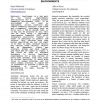Free Online Productivity Tools
i2Speak
i2Symbol
i2OCR
iTex2Img
iWeb2Print
iWeb2Shot
i2Type
iPdf2Split
iPdf2Merge
i2Bopomofo
i2Arabic
i2Style
i2Image
i2PDF
iLatex2Rtf
Sci2ools
HICSS
2002
IEEE
2002
IEEE
Legitimate by Design: Towards Trusted Virtual Community Environments
Legitimacy is a key part of the social requirements specification for a trusted virtual community environment (VCE). If an environment is not seen as legitimate, social conflicts may reduce community benefits like trade and e-commerce. Legitimacy must be built into a VCE at design time, or it may not be possible at all. This can be done using a legitimacy requirements framework (LRF) which interprets historical "rights" in terms of ownership of generic VCE objects. This involves more than merely specifying who has the right to do what to what, because objects may contain other objects, objects may be dependent, rights may interact, groups may have rights, and there may be rights to rights. A LRF could be used by software designers to derive legitimacy requirements for a wide variety of multi-user systems, from chat rooms to virtual realities. It would draw focus to common problems, and aid their common solution. A simple LRF is presented to provide a basis for designers of vi...
Biometrics | Generic Vce Objects | HICSS 2002 | Legitimacy Requirements | Social Requirements Specification |
Related Content
| Added | 14 Jul 2010 |
| Updated | 14 Jul 2010 |
| Type | Conference |
| Year | 2002 |
| Where | HICSS |
| Authors | Brian Whitworth, Aldo de Moor |
Comments (0)

